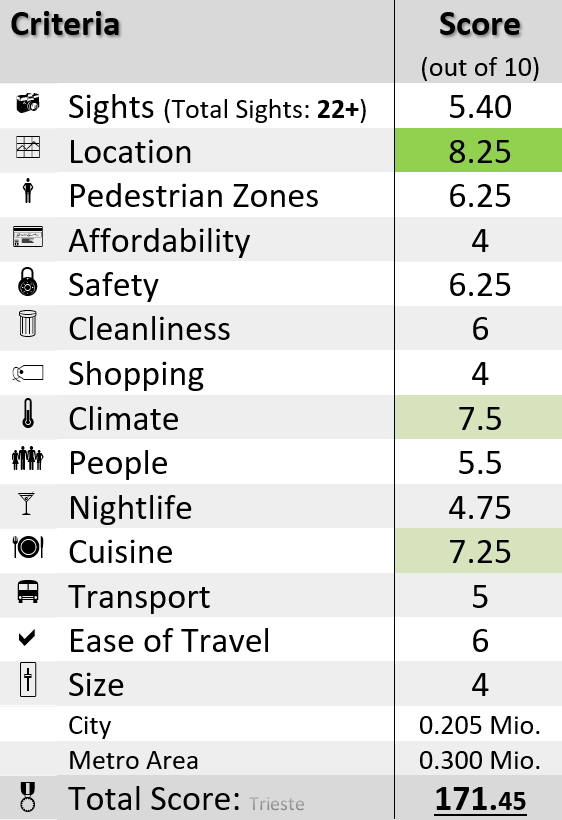by Velvet (image cropped) / CC BY-SA 4.0
A Unique Blend of Italian, Austrian, and Slavic Culture
Table of Contents
A. About Trieste
Trieste, a port city in northeastern Italy, sits on the Adriatic Sea and has a rich history influenced by various empires, including the Romans, Byzantines, and Habsburgs.
It served as a major seaport of the Austro-Hungarian Empire, fostering a unique blend of Italian, Austrian, and Slavic cultures that are evident in its architecture and traditions today.
Known for its coffee culture, Trieste has been a hub for the coffee trade for centuries and is home to Italy's oldest coffee house, Caffè San Marco.
The city boasts several stunning landmarks, such as Miramare Castle, overlooking the sea, and the grand Piazza Unità d'Italia, Europe’s largest seafront square.
Trieste’s unique location near the borders of Slovenia and Croatia has made it a crossroads of languages, cuisines, and traditions, enriching its cultural landscape.
➕ The Good
Situated along the Adriatic Sea and close to the Slovenian border, Trieste boasts a beautiful coastal setting with mountain views nearby.
The climate in Trieste is generally pleasant, especially in the warmer months, with mild winters and relatively sunny summers.
Furthermore, Trieste offers a great range of pedestrian-friendly areas, especially in its historic center, which is mostly car-free and great to explore.
The city is generally safe, with moderate crime levels and a comfortable atmosphere for tourists.
Finally, Trieste offers a delightful culinary experience with a blend of Italian, Slavic, and Austrian influences, especially known for its seafood and local wines.
➖ Negative Aspects
Fortunately, Trieste doesn't score lower than 4/10 in any category.
B. Best Things to Do in Trieste in 2025 (Detailed List with Photos and Information)
In total, we count more than twenty five sights in Trieste. The following contribute to a decent score of 5.40/10 in this most important category:
# Piazza Unità d'Italia 6 
This impressive, vast square overlooks the sea, framed by opulent neoclassical buildings and hosting important events and concerts.
It’s the largest seafront square in Europe, symbolizing Trieste’s unique mix of Italian, Austrian, and Slovenian influences.
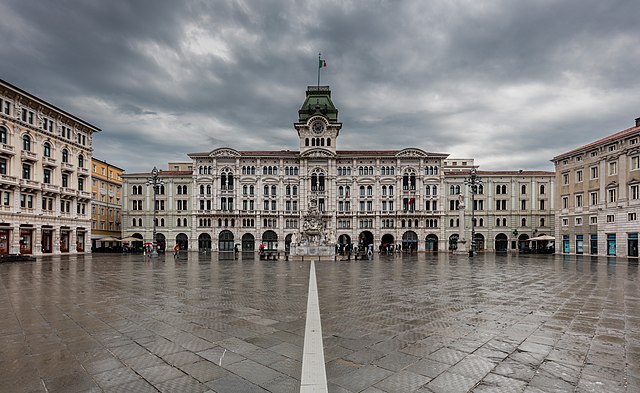
by Diego Delso / CC BY-SA 4.0
# Castello di Miramare 5 
Nestled on a cliff by the Adriatic Sea, this 19th-century castle is known for its white marble facade, lush gardens, and historical artifacts from Archduke Ferdinand Maximilian.
The castle provides stunning sea views and a glimpse into aristocratic life of the Habsburg era.
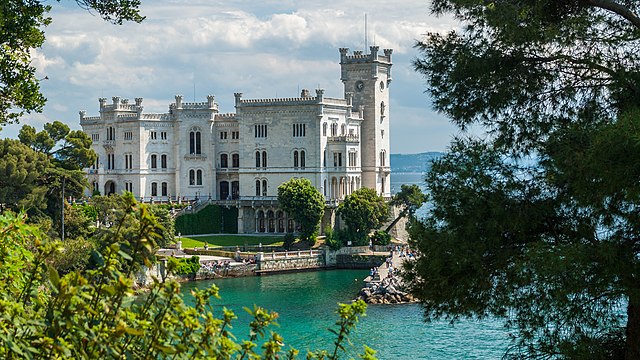
by Mihael Grmek / CC BY-SA 4.0
# Grand Canal 5 
Built to bring boats into the city, this Venetian-inspired canal is lined with charming cafes, colorful facades, and lively markets, making it a central, bustling area.
The canal’s iconic statue of James Joyce adds a literary touch to its scenic atmosphere.
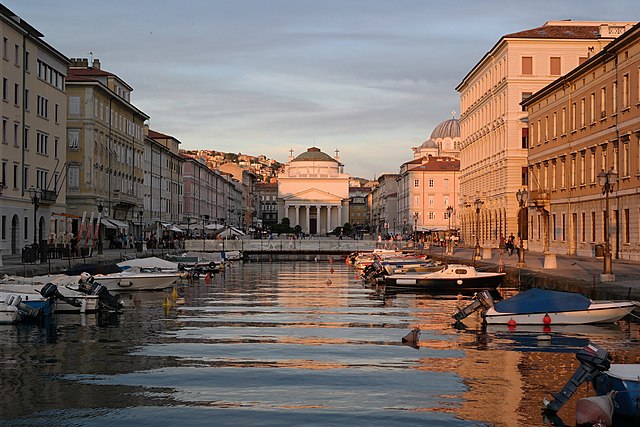
by Luca Aless / CC BY-SA 4.0
# Castello di San Giusto 5 
Overlooking Trieste, this medieval castle offers sweeping views of the city and Adriatic Sea, featuring a museum of ancient artifacts and a restored Roman theater nearby. It symbolizes Trieste’s medieval history and its strategic coastal position.
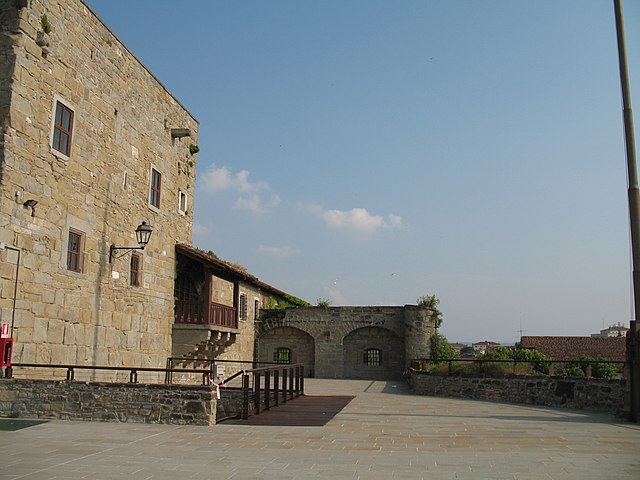
by Andrzej Otrębski / CC BY-SA 4.0, via Wikimedia Commons
# San Giusto Cathedral 5 
This historic cathedral features a mix of Romanesque and Gothic styles, famous for its intricate mosaics and frescoes, and is an important symbol of Trieste’s religious heritage. Its hilltop location provides stunning views of the city and sea.
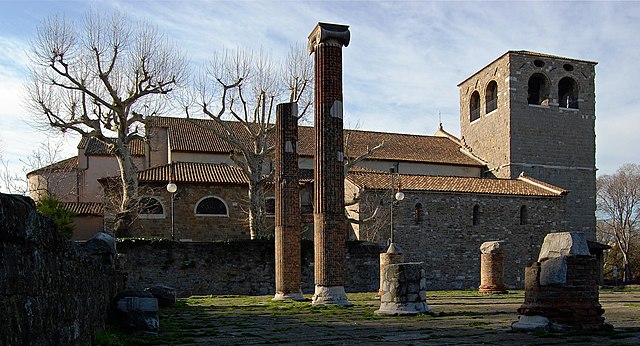
by Stefan Vladuck / CC BY-SA 4.0
# Museo Revoltella 5 
A neoclassical art museum founded by Baron Revoltella, it houses an impressive collection of 19th- and 20th-century Italian and European art, including sculptures, paintings, and modern installations. The museum highlights Trieste’s artistic and cultural growth.
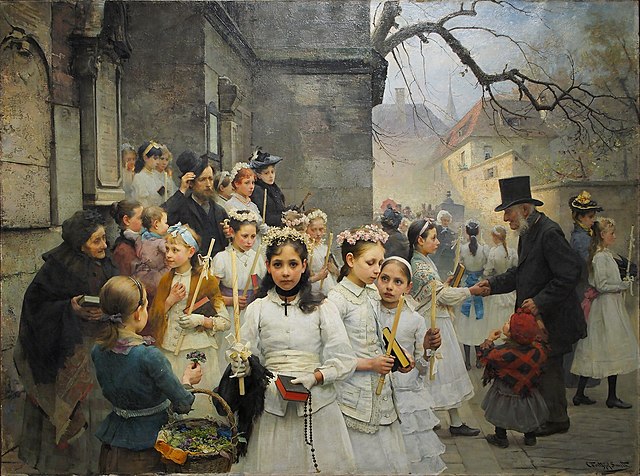
by Gitanes232 / CC BY-SA 4.0
# Grotta Gigante 5 
Located just 10 kilometers from Trieste and accessible by bus, Grotta Gigante is one of the largest accessible show caves in the world, with a main cavern over 100 meters high, 65 meters wide, and 130 meters long. Visitors descend via hundreds of steps into a cathedral-like underground world of colossal stalactites and a thrilling sense of natural grandeur.
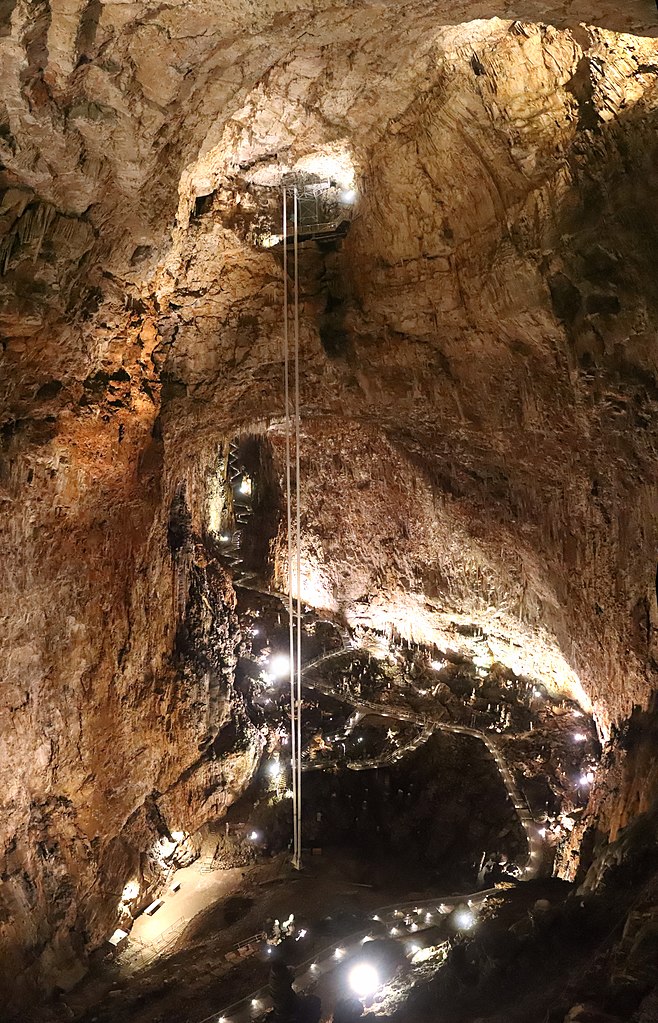
by Andrzej Otrębski / CC BY-SA 4.0, via Wikimedia Commons
# Molo Audace 4 
The Molo Audace is a scenic pier in Trieste stretching 246 meters into the Adriatic Sea, offering sweeping views of the city and a popular sunset spot. It’s named after the Italian destroyer Audace, which docked here in 1918.
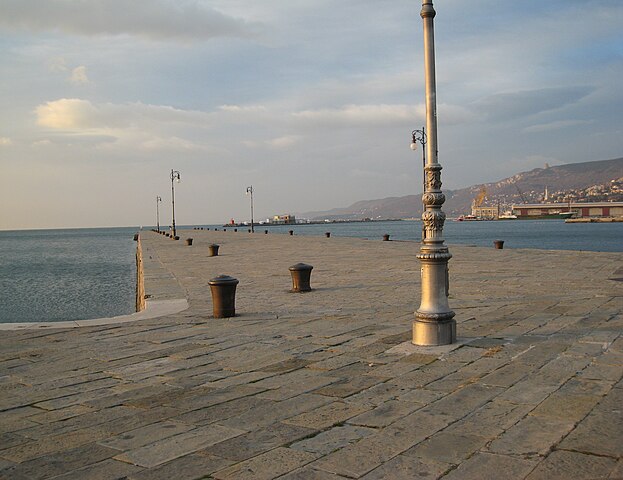
by Tiesse / CC BY-SA 3.0
# Civico Museo della Risiera di San Sabba 4 
This museum and former Nazi concentration camp memorializes the atrocities committed here during World War II, emphasizing Trieste’s somber history under German occupation. It’s the only Italian concentration camp with a functioning crematorium, now a poignant symbol of remembrance.
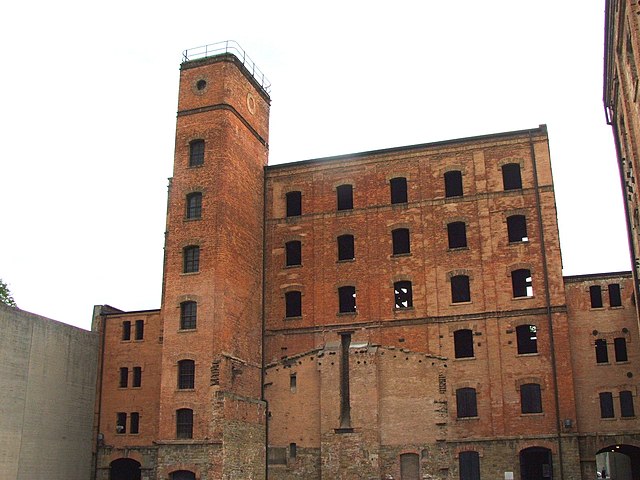
by Twice25 & Rinina25 / CC BY-SA 3.0
#10 | Teatro Romano 4 
Built in the 1st century AD, this ancient Roman amphitheater sits at the base of San Giusto Hill, once hosting up to 6,000 spectators for plays and gladiator events. Excavated in the 1930s, it's a testament to Trieste’s Roman past and open for exploration.
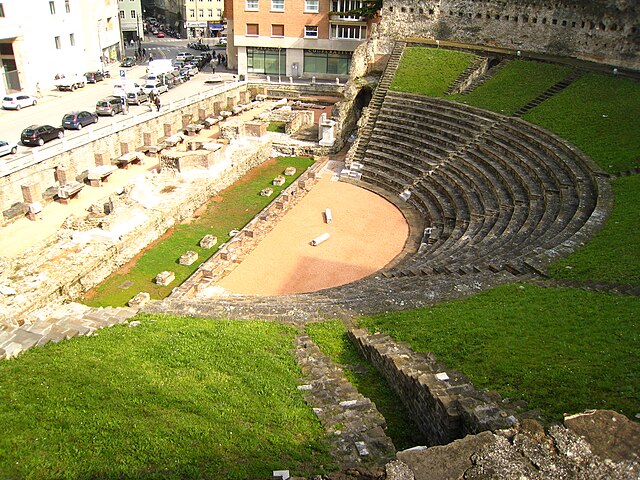
by Tiesse / CC BY-SA 3.0
C. Other Notable Sights and Attractions in Trieste
#11 | Faro della Vittoria 4 
Standing 68 meters tall, this lighthouse and war memorial commemorates World War I soldiers while guiding ships in the Gulf of Trieste. Its terrace offers panoramic views of the Adriatic Sea and the surrounding mountains.
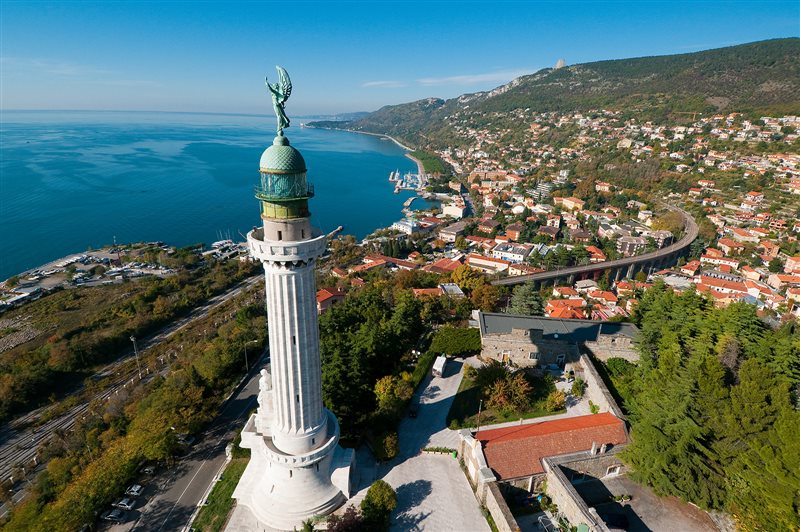
by BerserQL / CC BY-SA 4.0
#12 | Civico Museo Sartorio 4 
Housed in an 18th-century villa, this museum displays an eclectic collection of fine art, furniture, ceramics, and manuscripts, highlighting Trieste’s aristocratic past. Notably, it includes works by artists such as Tiepolo and local artifacts from the 17th to 19th centuries.
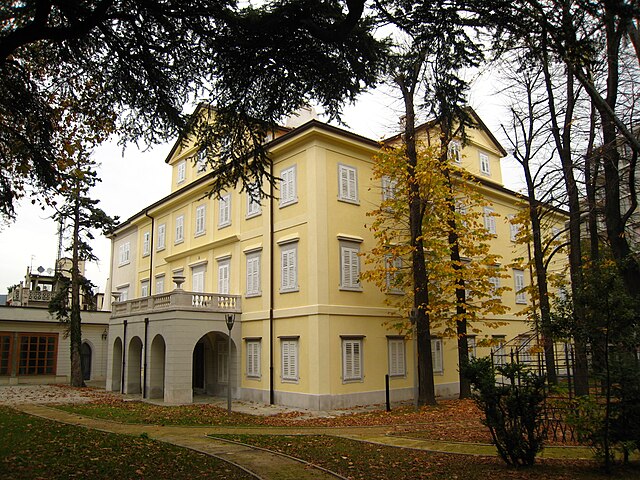
by Tiesse / CC BY-SA 3.0
– Viale XX Settembre 4
This vibrant pedestrian boulevard is lined with trees, cafés, theaters, and shops, making it a lively cultural and social hub of Trieste. Often described as Trieste’s answer to La Rambla in Barcelona, it is a favorite spot for evening strolls, gelato runs, and people-watching, with the elegant Politeama Rossetti theater anchoring its cultural charm.
– Trieste Waterfront 4
Trieste’s waterfront blends Austro-Hungarian architecture and Italian coastal charm, showcasing iconic landmarks like the Molo Audace pier and the Porto Vecchio, a former commercial port now a cultural center. Strolls along the waterfront provide views of both modern yachts and vintage maritime relics, connecting the city’s past and present.
– Città Vecchia (Old City) 4
Trieste’s Old City features medieval architecture, narrow winding alleys, and historic buildings that reflect its multicultural past influenced by Venetian, Austrian, and Slavic styles. It’s a maze of history and charm, where each corner tells a story of the city’s heritage.
– Arco di Ricardo 4
The Arco di Riccardo, a Roman triumphal arch dating back to the 1st century BC, is tucked away in Trieste’s Old Town, a silent witness to over two millennia of the city’s history. Embedded within a modern building, the arch is a striking fusion of ancient Rome and contemporary life, offering a glimpse into Trieste’s deep archaeological roots.
– Tram de Opcina 4
The historic Tram de Opcina, a unique hybrid tram-funicular railway opened in 1902, climbs steeply from Trieste’s city center up to the karst plateau of Opicina, offering breathtaking views over the city and the sea along the way.
– Historic Cafes 4
Trieste’s stunning historic cafés, including legendary spots like Caffè San Marco and Caffè degli Specchi, blend Viennese elegance with intellectual legacy, having hosted writers like James Joyce and Italo Svevo. With marble tabletops, ornate chandeliers, and shelves of books, they continue to be hubs of culture, conversation, and perfectly brewed espresso.
– Chiesa Serbo Ortodossa Di San Spiridione 4
The Chiesa Serbo Ortodossa di San Spiridione, with its distinctive Byzantine Revival architecture and striking blue domes, is a symbol of the city's multicultural heritage and houses a richly decorated interior featuring golden iconostases and intricate frescoes.
– Barcola (Beach) 4
Barcola Beach, a scenic seaside promenade stretching between Trieste and Miramare Castle, is a favorite summer retreat for locals who sunbathe on stone platforms, swim in the Adriatic's crystal-clear waters, and enjoy refreshing drinks from nearby kiosks. The long, pine-shaded walkway also draws joggers and cyclists year-round, offering panoramic views of the Gulf of Trieste and vibrant Mediterranean sunsets.
D. Best Day Trips and Excursions from Trieste
SKOCJAN CAVES 6 
The Škocjan Caves, a UNESCO World Heritage Site about 28 km from Trieste in Slovenia, feature one of the world’s largest underground canyons, with towering chambers, a roaring river, and a high bridge spanning the gorge.
Located just 45 minutes by car, they’re harder to reach than Grotta Gigante, but guided tours from Trieste are available—advance booking is recommended.
Cave 🌍 Distance from Trieste: ca. 28 km
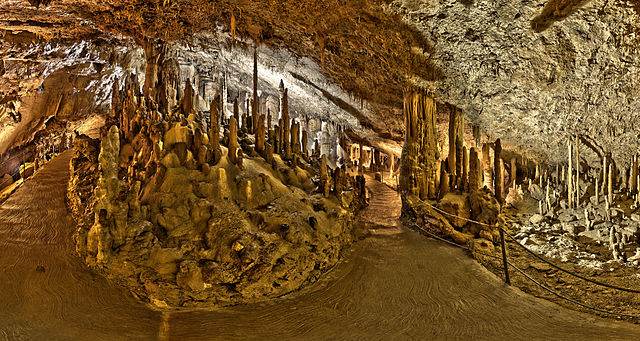
by Lander / CC BY-SA 3.0
Piran 6 
Located on the Slovenian coast, Piran is a picturesque town known for its Venetian Gothic architecture, narrow alleys, and vibrant coastal views. It’s a popular day trip from Trieste, offering charm and Adriatic beauty.
City Distance from Trieste: ca. 37 km (40 min.)
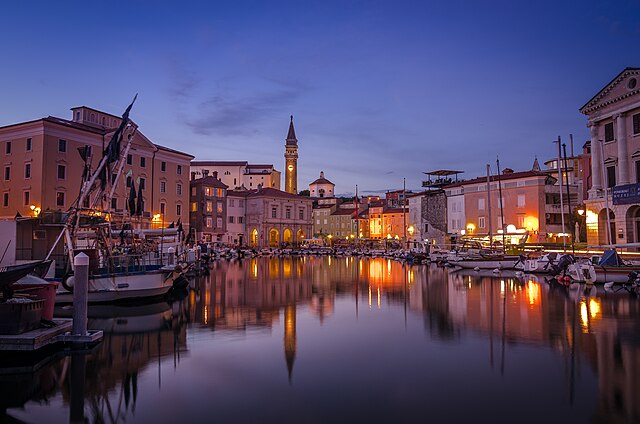
by Etienne O. Dallaire / CC BY-SA 4.0
Koper 6 
As Slovenia’s largest coastal city, Koper combines medieval architecture with modern attractions and serves as a major port on the Adriatic Sea. Its Venetian influence is evident in landmarks like the Praetorian Palace and Cathedral of St. Nazarius.
City Distance from Trieste: ca. 23 km
by TICKoper / CC BY-SA 4.0
Muggia 4 
Muggia, a small, charming seaside town just 13 kilometers south of Trieste, is the only Istrian town still in Italy. The City feels like a peaceful miniature Venice, with narrow alleyways, colorful houses, and a picturesque harbor lined with fishing boats. Its small medieval old town, Venetian-style architecture, and relaxed cafés make it a perfect and easy day-trip from Trieste.
City Distance from Trieste: ca. 13 km
E. Top 10 List of the Best Things to Do in Trieste (including close-by excursions)
To sum things up, these are the ten best sights we recommend to you when visiting Trieste for at least two entire days.

